Severe COVID-19 disease and the high frequency of its long-term complications are now a major health problem worldwide. Due to the significant heterogeneity of COVID-19 disease profiles, biomarkers that allow either the identification of patients at high risk for developing severe forms of COVID-19 and its long-term complications, or guide personalized treatment options, are scarce. The HERVCOV project aims to analyze the role of human endogenous retroviruses (HERVs), known for their high pro-inflammatory potential, in the immunopathogenesis of COVID-19 and to identify and evaluate a set of biomarkers which will be important for the diagnosis, prognosis and follow-up of COVID-19 patients and their prioritization for targeted therapy. Recent data from the consortium has demonstrated that HERV-W envelope protein is highly expressed in lymphocytes of COVID-19 patients and correlates with inflammatory markers and respiratory outcome of the disease, strongly suggesting the role of HERVs in COVID-19 pathogenesis.
The project aims to assess the biological pathways and functions that underlie the association of HERV expression and activation with severe COVID-19 forms and related complications. Biomarkers based on HERV pathogenic protein activation, SARS-CoV-2-specific immune responses, cytokine production and mandatory medical blood analyses for COVID-19 clinical monitoring will be studied in samples from different forms of COVID-19: acute, post- neuro- and long-COVID patients. Parameters will be determined that predict the clinical course of the disease and aggravation of SARS-CoV-2-induced symptoms and allow potential clustering of different bio-clinical profiles of COVID-19 patients. Diagnostic and prognostic panel(s) translated from our fundamental research and subsequent evaluations of HERV-associated biomarkers will be assessed to define novel indicators in precision medicine-based therapeutic strategies, leading to individualized medical treatment in COVID-19.
